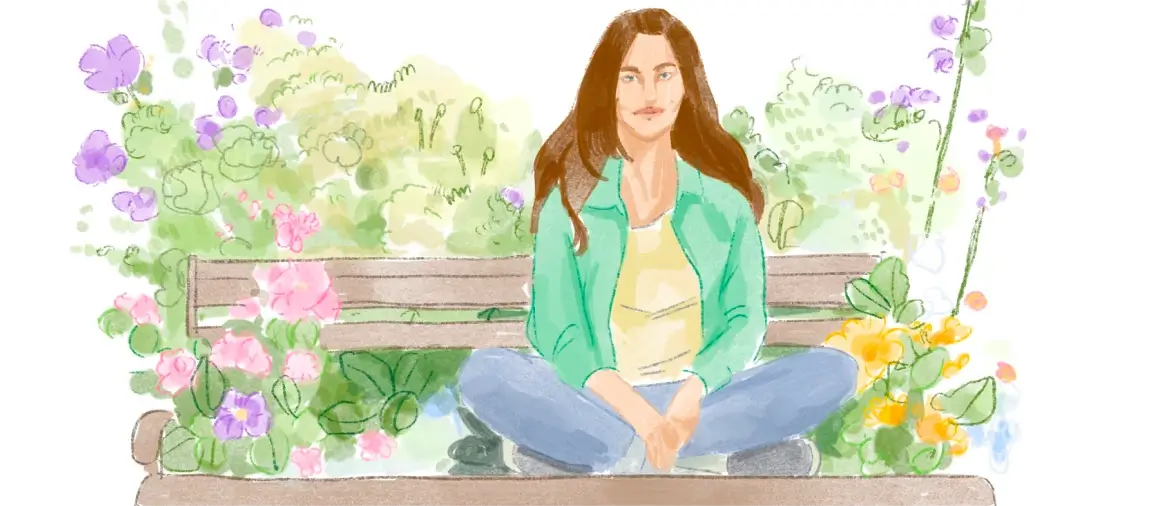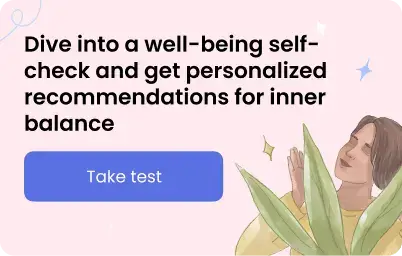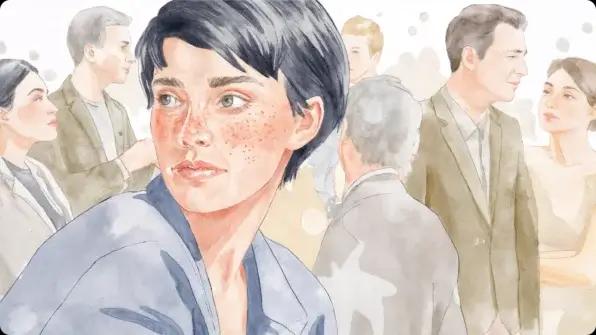Sadness is a normal human emotion that all of us tend to experience from time to time. Feeling low because of work problems, relationship arguments, or even weather changes is common. However, if you experience depressive thoughts most of the time without any reason, it might be an issue.
How often do you ask yourself something like, “Why do I randomly get sad?” or “Why do I feel like crying for no reason?” How often do you actually cry, have no energy, or get frustrated with routine tasks? If this happens quite often and influences the quality of your life, it can be a warning sign.
Why do I feel sad for no reason?
There’s nothing wrong with experiencing melancholy from time to time. However, persistent or random sadness usually has hidden roots. Let’s glimpse the most probable ones below.
Childhood Trauma
“How can experiences from my early years influence my current mood?” In fact, directly. There’s a pretty strong bond between childhood trauma symptoms and overwhelming sadness.
- Adverse childhood experiences (ACEs) can lead to changes in stress hormone systems. As a result, people who survived childhood trauma might find it more challenging to handle stressful situations.
- Childhood trauma may result in developing negative patterns like self-loathing, guilt complex, low self-esteem, etc. At first sight, these might be background feelings. But in reality, they can cause deep sadness.
- Emotional regulation issues might also be a result of ACEs. Questions like, “Why am I so angry for no reason?” and “Why do I get random waves of sadness?” can signal that you need professional help.
- Difficulties in building relationships may be one more outcome of childhood trauma. If you didn’t have a role model of a healthy family in your past, this could lead to you unconsciously choosing toxic relations or isolating yourself. This, in turn, can make you feel sad “for no reason.”
Find out whether there’s an emotional baggage that’s holding you back. Take a free test from Breeze to get personalized insights into your experience.
Lack of sleep
Sleep disturbance is one of the main depression symptoms. But can it work vice versa? In fact, yes.
Lack of sleep can make you feel frustrated, sad, or worried. Even more, it can alter brain activity, making it tougher to control your emotions and leaving you more vulnerable to depression.
Viviana Greco, PhD, states, “Sleep deprivation disrupts the connection between two brain regions involved in emotional regulation: the amygdala and the prefrontal cortex. The amygdala, which processes negative emotions, becomes overactive, while the prefrontal cortex, responsible for decision-making and impulse control, loses its moderating influence. This makes it harder to control emotions, leading to inappropriate and intense emotional responses.”
How do you feel after a night when you didn’t have enough sleep? Probably like a dish towel. Tiredness can make you train less, reduce social interactions, and be less productive.
As a result, you experience a domino effect of inactivity, insomnia, and low mood. If not addressed on time, your mental health can get worse.
So, next time you ask yourself, “Why do I feel sad for no reason?” think about how much sleep you’ve had over the past week. Establishing healthy sleep habits might help you feel better.
Stress
Let’s remember the story of Arthur from the 2019 “Joker” film. He experiences uncontrollable crying and laughing episodes, worsening when Arthus is stressed. Eventually, his symptoms progress, and he turns into a violent Joker, one of the villains in Gotham City.
How is it connected to real life?
Luckily, we don’t meet mentally ill villains daily on the streets. And, even more, we don’t turn into villains when experiencing stress. But there is a common thread.
Under the influence of stress factors, people are more prone to feeling depressed for no reason. Moreover, if you are already feeling down, adverse events often amplify this sadness.
Imagine that you saw a beautiful jacket in the shop a few days before but didn’t have enough money. You were waiting for your salary to buy it immediately. Then, pay day arrives, and you rush to a shop to make your desired purchase… and there’s no size left.
What do people usually do in such situations? Feel sad for some time and then rush to find something else.
Instead, for people who haven’t had enough sleep, are dealing with problems at work, or have financial issues, this can be the last straw, causing them to fall into tears. After a few days, they might even forget about the situation but still find themselves asking questions like, “Why am I so sad?”
They are not depressed. They are overloaded and exhausted.
Grief
Finally, yet importantly. Loss is one of the main things that make people sad. And we are not only talking about the death of your closest people, a dramatic breakup, or your best friend moving to another country. Grief is more complex.
You can experience grief after losing a serious amount of money, ending a long-term hobby, finishing a TV series, going back from a vacation, etc.
The next time you face the question, “Why am I upset for no reason?” think deeper about the potential cause. Have you made changes in your habitual lifestyle recently? If yes, you can experience some turbulence, and that’s normal.
Why do I feel depressed for no reason?
While some people use the words “sadness” and “depression” as synonyms, there’s a massive gap between them.
Sadness is a normal, emotional response to specific events. It’s typically temporary. It tends to fade with time or as the triggering event is resolved.
While sadness can be intense, it usually doesn’t affect your daily life for an extended period. People can still experience moments of happiness and enjoyment.
Depression is a medical condition that affects our mood, thoughts, and physical health. It’s not just a feeling but a pervasive and persistent state. It can result from genetic and environmental factors.
Viviana Greco, PhD, comments, “Exposure to trauma or abuse, living in poverty, and a lack of social support and isolation are key environmental factors that can contribute to depression.”
Depression affects work, relationships, and general well-being. People with depression may experience feelings of sadness and worthlessness and may even dwell on thoughts about self-harm or suicide.
In the previous section, we tried to find the answer to the question, “Why am I sad?” Besides, if your symptoms are more severe and you can’t find a way out, let’s go further. We’ll look into the list of factors that drive depressive thoughts and why they appear.
High-Functioning Depression
One of the most probable answers to the question, “Why am I so depressed?” is actual depression. Can you imagine that about 8.3% of US adults experience its symptoms?
Depression doesn’t always look like it does in movies, when the main character stays in bed for weeks, constantly crying. While this situation is also quite typical for this mental health condition, it isn’t the only possibility.
Some people with high-functioning depression can keep up with daily responsibilities and stay active most of the time.
Thus, when dealing with the question, “Why do I suddenly feel sad and cry for no reason?” they can’t even imagine that they are experiencing depression symptoms.
If you’ve seen the film “Up in the Air,” you probably remember the story of the main character Ryan Bingham. He is a great example of a person with high-functioning depression.
While his career keeps him busy and appears successful, Ryan grapples with a profound sense of detachment and deep sadness. Despite his confidence, he struggles with emotional emptiness and a longing for genuine human connection.

Signs of high-functioning depression
- Loss of motivation. “Am I lazy or depressed?” If you’ve ever thought about it, it is vital to pay more attention to your mental health. A lack of interest and motivation in things that you used to consider impressive is a symptom of something more than just feeling low.
- Lonely crowd. Even when surrounded by people, you feel utterly alone, like you’re watching life from behind a glass wall. Over time, you become a pro at putting on a smile for the world, even when your heart feels heavy.
- Persistent, overwhelming sadness. It’s like having a constant gray cloud looming, dimming the brightness of everyday life. You can randomly burst into tears, feeling like someone turned down the volume knob on any happy feeling.
- Concentration fog. Trying to focus is like attempting to see clearly through a foggy window; the clarity just isn’t there. Lack of concentration can worsen because of constant self-doubt and drive for perfection.
- Low energy. It’s as if your battery never quite charges fully, leaving you low on power. You may want to be more active and do more, but even the simplest tasks might feel like climbing a mountain.
How can you check whether you experience the symptoms of high-functioning depression? It’s better to contact your healthcare provider and get a complete assessment.
Other Medical Health Conditions
There are also other answers to the question, “Why do I feel depressed for no reason?” Underlying medical conditions are quite common in this list.
Let’s highlight the most common mental illnesses that can cause low mood and depressive thoughts.
- Bipolar disorder. Episodes of depression change into mania and vice versa. Bipolar disorder is all about mood fluctuations, when one day you might ask yourself, “Why do I suddenly feel sad for no reason?” and the next day, you have the world at your feet.
Viviana Greco, PhD, adds, “Bipolar disorder is characterized by alternating manic and depressive episodes. Manic episodes involve high levels of physical and mental activity, euphoria, and often impulsive or risky behavior. In contrast, depressive episodes are marked by feelings of hopelessness and worthlessness, exhaustion, and profound sadness.”
- Post-traumatic stress disorder (PTSD). Whether as a result of repressed childhood trauma or after an event that happened in adulthood, PTSD can bring you flashbacks, nightmares, and persistent, overwhelming sadness.
- Borderline personality disorder (BPD). People with BPD may experience impulsivity, unstable self-image, and intense fear of abandonment. They can run from excitement to “I’m sad again” numerous times a day.
- Generalized anxiety disorder (GAD). Worrying about everything all the time might be a sign of GAD. However, it isn’t the only symptom. Low mood and irritability can follow your anxiety, making everyday life feel exhausting.
- Social anxiety disorder. Introversion is common, but when you experience social anxiety and fear of communication, you may need help. These symptoms often make people isolate themselves, which can lead to deep sadness and even depression.
- Attention-deficit/hyperactivity disorder (ADHD). While ADHD itself isn’t a mood disorder, impaired self-regulation, inattention, hyperactivity, and impulsivity can cause frustration and unexplained sadness.
Hormonal changes
Hormonal fluctuations can arise from various causes and lead to a range of symptoms. You might notice changes in weight and appetite, insomnia, acne, or excess body hair, to name just a few.
But there’s more to it — these hormonal shifts can also trigger low mood and depression. Let’s dive into the main scenarios where this occurs and explore how it can impact your mood.
- Menstrual сycle. You may face the question, “Why do I like feeling sad?” because of changes in estrogen and progesterone levels. These hormonal shifts can intensify emotional responses and lead to mood fluctuations.
- Pregnancy. As your body gears up for childbirth, heightened emotional sensitivity and depressive thoughts can become part of the journey.
- Postpartum period. After childbirth, there’s a rapid drop in pregnancy hormones. This sudden change can contribute to postpartum depression or the “baby blues,” making the early days of motherhood particularly challenging.
Sleep deprivation, the stress of caring for a newborn, and the lack of social support are all factors that, in addition to hormonal shifts, can significantly impact a mother’s well-being.
- Perimenopause and menopause. The transition to menopause involves a decrease in estrogen. As a result, you might experience overwhelming sadness.
- Puberty. Many teens come up with the question, “Why am I always depressed?” Nevertheless, during adolescence, fluctuating hormone levels combined with the challenges of growing up can cause significant stress.
- Hormonal birth control. Some individuals may experience mood changes, including depression and anxiety, as a side effect of hormonal contraceptives. If this happens, it’s highly recommended to consult with your healthcare provider.
“I Am Sad”: Understanding the Feeling
Being sad is different for everyone. Impressive, isn’t it? Even this basic emotion can be experienced in various ways, and our reactions are often different as well.
Thus, let’s start by identifying the low mood meaning. This might help you notice the oncoming random waves of sadness that can overwhelm you much faster. Moreover, these symptoms can be useful to remember to improve your emotional quotient (EQ) and understand others’ emotions better.
So, what are the signs that the deep sadness is right at the corner?
- feeling unmotivated
- sleeping problems (insomnia or waking up tired no matter how much you’ve slept)
- changes in appetite
- getting mad over little things
- frustration
- feeling empty
It’s important to note that sadness isn’t as negative as it can feel. When experienced occasionally and because of a particular reason, it’s a healthy response to life challenges.
What’s more, feeling down has a meaning. This state helps us recover from situations when things don’t go as planned.
Nonetheless, if you face the question, “Why am I so sad all the time?” this isn’t the case. In the next section, what to do if you are feeling lost in life and experiencing never-ending sadness.
Do you want to understand your emotions better and get more empathetic to others? Find out your emotional intelligence score and how to improve it with the Breeze EI test.
“I Feel Sad”: When to Seek Help
As we’ve already said, it is natural to feel low occasionally. Why is sadness important?
It helps us maintain a balanced emotional life by contrasting with happiness and other positive emotions. Moreover, it enhances our ability to empathize with others. Understanding our ups and downs helps us relate to and support others in their times of need.
However, there are situations when sadness goes beyond normal reactions. We’ve listed why you can feel constantly depressed in the previous sections. Now, let’s delve deeper into when to contact a specialist and seek help.
- Unexplained aches or pains. Feeling discomfort like headaches, stomachaches, or muscle tension akin to a persistent, uninvited guest in your body isn’t normal.
- Withdrawing from social activities. Isolating oneself from friends and family or avoiding situations you previously enjoyed might be a red flag.
- Thoughts of suicide. Wrestling with recurring notions of self-harm, like storm clouds threatening to overshadow the sunny skies of your mind, demands urgent attention and care.
- Persistent sadness. If you look for the answer to the question, “Why am I always sad?” for over two weeks, it can be the first sign of depression.
If you find yourself constantly weighed down by frustration, sadness, or a general low mood, it will be beneficial to reach out to a therapist for support and guidance.
Disclaimer
This article is for general informative and self-discovery purposes only. It should not replace expert guidance from professionals.
Any action you take in response to the information in this article, whether directly or indirectly, is solely your responsibility and is done at your own risk. Breeze content team and its mental health experts disclaim any liability, loss, or risk, personal, professional, or otherwise, which may result from the use and/or application of any content.
Always consult your doctor or other certified health practitioner with any medical questions or concerns
Breeze articles exclusively cite trusted sources, such as academic research institutions and medical associations, including research and studies from PubMed, ResearchGate, or similar databases. Examine our subject-matter editors and editorial process to see how we verify facts and maintain the accuracy, reliability, and trustworthiness of our material.
Was this article helpful?







